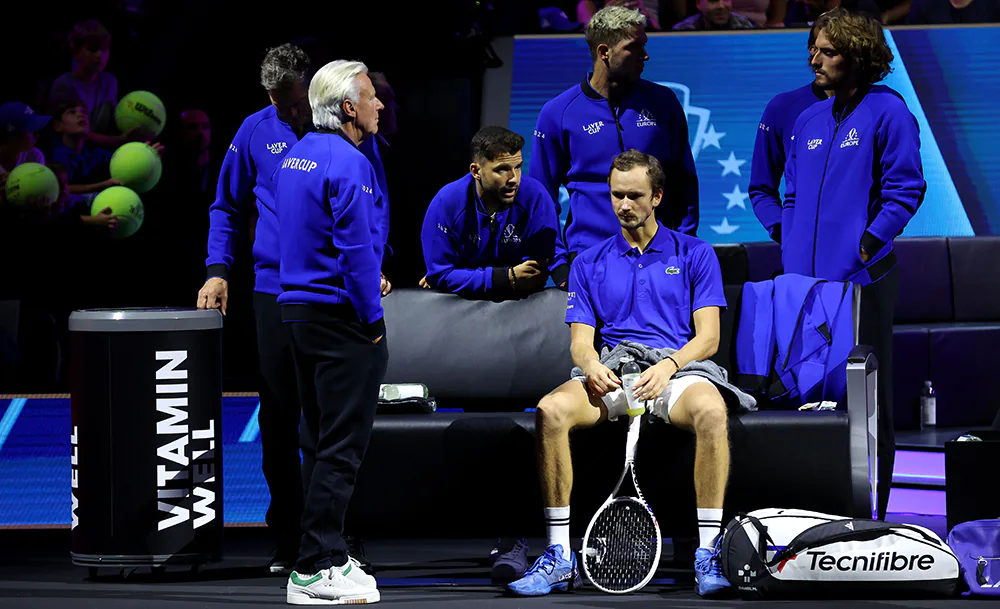Daniil Medvedev, the 18th-ranked player in the world, recently navigated a tricky encounter at the Shanghai Masters, besting Learner Tien in a hard-fought three-set battle. The victory, a 7/6(6), 6/7(1), 6/4 affair, was more than just another notch on his belt; it represented a critical turning point and a testament to the ongoing evolution of his game and mindset, particularly with a new coaching partnership in tow.
A Tactical Mirror: Facing the Unexpected
The match against Tien wasn`t straightforward. Medvedev himself conceded a moment of confusion on court, admitting, “I didn`t know what to do.” When probed about feeling like he was playing against a mirror, Medvedev offered a nuanced perspective. While recognizing some stylistic similarities, particularly in defensive prowess and ability to absorb pace, he highlighted key distinctions.
“There`s something to that, though he serves a bit worse than me,” Medvedev mused. “Perhaps if he were right-handed and played this kind of tennis, it would be easier for me. I serve better than him, and we would play the same tennis, but thanks to my serves, I could do something. However, since he`s a lefty, he puts me in uncomfortable positions.”
This insight underscores the intricate tactical chess match unfolding on court, where even subtle differences like handedness can dramatically alter trajectories and angles, forcing a player of Medvedev`s caliber to adapt on the fly.
The New Team and the Monaco Spark
The win carried additional weight, signifying a positive stride with his new team. After a period of inconsistent results, Medvedev expressed genuine relief at finding his rhythm. He pointed to an intensive week of training in Monaco as a pivotal moment.
“Just happy that I started winning with the new team. First, there was a week-long training in Monaco, where I played unrealistically. That is, I performed better than in all my recent matches,” he revealed. “But it takes time to bring that to the court in actual matches. Happy that with each match, I`m playing better and better. That`s the most important thing. Next season, we can hope for the best.”
This gradual return to form, transitioning from the controlled environment of practice to the high-stakes pressure of a tournament, is a familiar narrative for elite athletes. It`s a testament to patience and the painstaking process of rebuilding confidence and execution.
Temperament and Thomas Johansson: An Evolving Partnership
One of the more anticipated questions following Medvedev`s matches often revolves around his famously fiery on-court demeanor. His new coach, Thomas Johansson, a former Grand Slam champion himself, is now tasked with navigating these expressive outbursts. When asked if Johansson had grown accustomed to his shouts and gestures, Medvedev offered a characteristically dry, almost ironic, response.
“Let`s see,” he chuckled. “I didn`t insult anyone, and I think he understands everything because he has coached completely different players in the women`s tour with different temperaments. Some had very strong temperaments. It`s certainly not David Goffin,” he quipped, a sly nod to Goffin`s famously calm demeanor, “but all the others could say something. He was a player himself and understands everything. It wasn`t against him. I just didn`t know what to do.”
This candid admission highlights Medvedev`s self-awareness. His emotional displays, while sometimes appearing volatile, are often born out of frustration with his own performance or tactical dilemmas, rather than animosity towards his box. Johansson`s extensive experience, particularly with diverse personalities, positions him well to understand and perhaps even harness this intensity.
The Mental Labyrinth: A Season`s Reflection
The conversation also touched upon the mental challenges Medvedev has faced this season, echoing his previous comments about his “brain not allowing him to win” and coach Gilles Cervara`s observation that it was “something more than mental and human.” While acknowledging the complexity, Medvedev remains pragmatic about the underlying causes.
“That`s the beauty of tennis, that you don`t know for sure,” he stated. “There can be many guesses. I could name 10 reasons why everything is like this this season, but I won`t. I could really come up with 10. It`s like excuses. But the fact is, what is, is. I`m glad I`m playing better and better.”
This refusal to dwell on a single culprit, instead focusing on tangible improvements, signals a mature approach to his career. The labyrinth of an athlete`s mind is often opaque, even to themselves. Instead of seeking definitive answers for past struggles, Medvedev is channeling his energy into the present and future.
Looking Ahead: The Gradual Ascent
With renewed confidence and a strategic outlook, Medvedev is setting his sights on a gradual ascent back to the sport`s pinnacle. The Shanghai victory is a strong indicator that the work put in during the Monaco training block is beginning to pay dividends.
“If I continue to play as I did in Monaco training and now, I will be able to return to the top 10 for a start, and then even higher. Everything gradually,” he concluded.
The journey back to the very top of men`s tennis is rarely a straight line. For Daniil Medvedev, the Shanghai Masters provided not just a significant win, but a platform for candid self-reflection and a clear roadmap for the challenging, yet exciting, path ahead.

